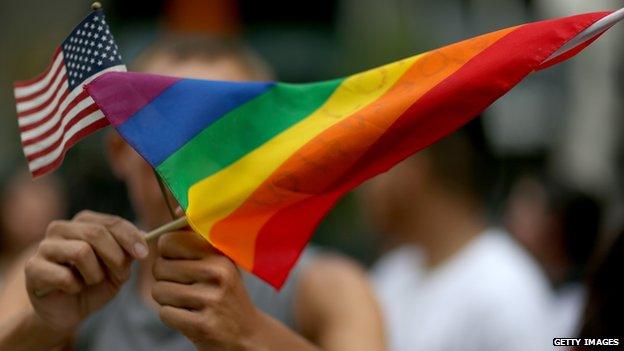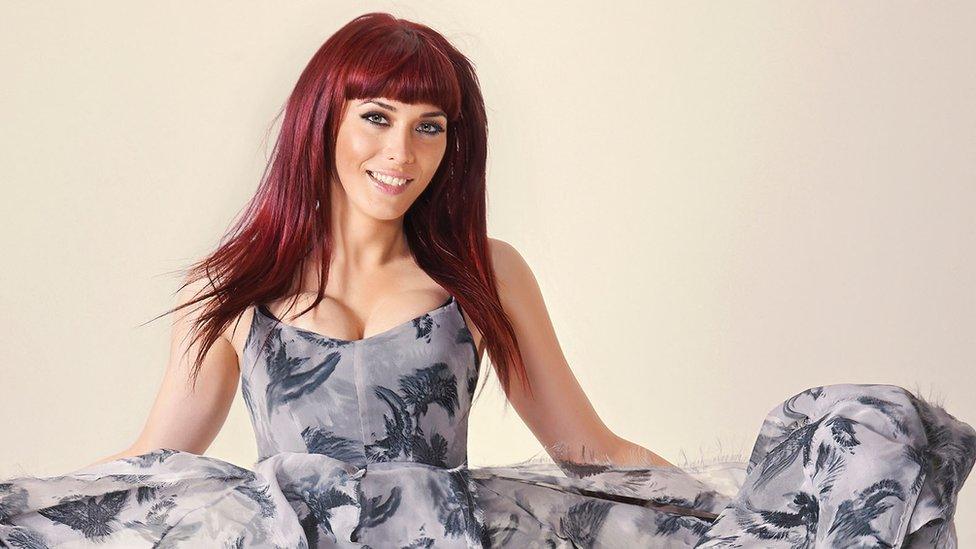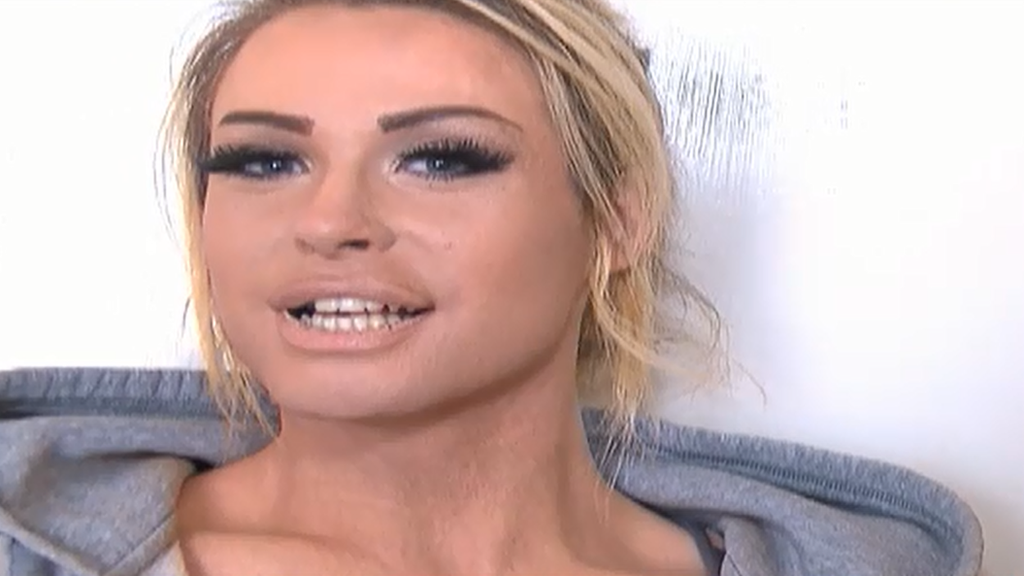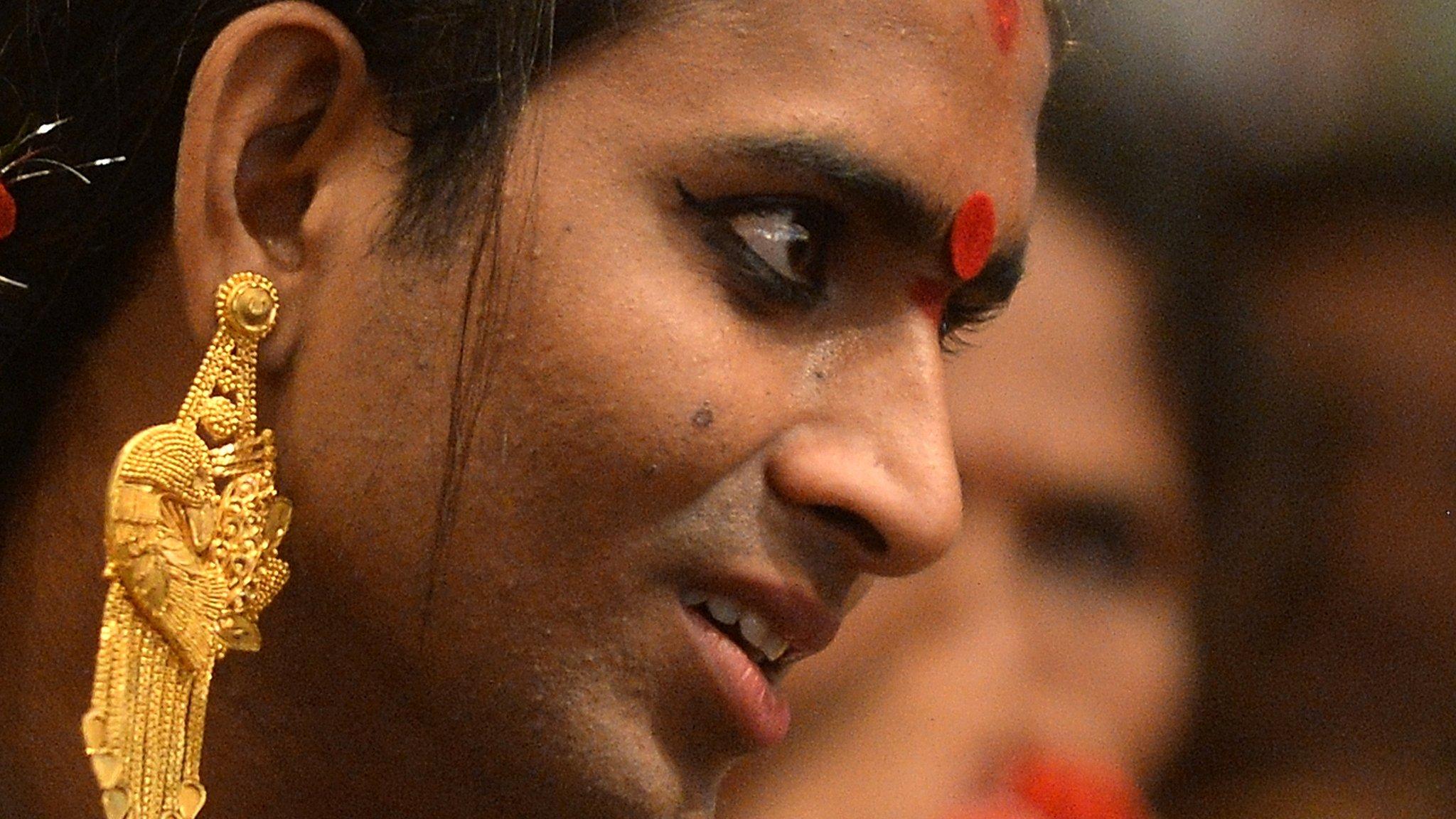Transgender 13-year-old Zoey having therapy
- Published
Zoey, like many kids, is using drugs to delay puberty and change her birth gender
The hit comedy series Transparent, which tells the story of a 70-year-old dad transitioning into a woman, has picked up two Golden Globe awards and shone a spotlight on the lives of transgender people.
With more realistic portrayals of transgender characters, Hollywood may be helping society accept transgender people - even transgender children. A growing number of children are using prescription puberty blockers so that they can stop unwanted changes in their bodies like breasts or facial hair.
It's a fairly new treatment and a controversial one. Critics say blocking puberty is tantamount to child abuse and that children should be counselled to accept the bodies into which they were born.
But parents of children with severe gender identity disorder and the doctors who treat them say doing nothing can be harmful and that allowing children to go through puberty in the "wrong gender" can result in severe depression and suicide.
"When I was little I always said I'm a girl. I look like a girl. My heart is a girl heart," says 13-year-old Zoey, who was born a boy but who now identifies as a girl. Her doctor blocked her puberty and then prescribed cross-sex hormones to allow her to develop as a female.
"When I got older, I hid it so I would be accepted at schools, which was the hardest time of my life because I had to act like somebody that I was not."

A recent US study found that 41% of transgender respondents attempted suicide
Zoey started identifying as a female from a very young age. As a toddler, she used to ask her mother, why "God make a mistake" and gave her the wrong body.
The puberty suppressors Zoey and others take are reversible and FDA-approved because they have been used for decades in children going through premature puberty.
But for children with gender dysphoria, or gender identity disorder, the blockers are being started anywhere from age nine to 17. The drugs are credited with buying the children time so they can figure out if they really do want to live as a different gender. Teenagers can then take cross-sex hormones to help them physically develop into the opposite gender.
Doctors have only been using the blockers in transgender children since the late 1990s when Dutch doctors started the practice. Zoey's doctor, Dr Johanna Olson, director of the Center for Transyouth Health and Development at Childrens' Hospital in Los Angeles, first started using them in 2007.
"Of course there are fears around side-effects," says Dr Olson. She says one of her first patients was a 12-year-old who had been menstruating for two years and attempted suicide every time a period arrived.
"So that's obviously a huge part of the balance. I'm going to lose this kid before we have enough data to say 'yes this is a safe intervention on 12 and 13 year olds,' the kid might kill himself," says Dr Olson.

Transgender problems
•41% of transgender people in US have attempted suicide (1.5% for general population)
•Four-times more likely to live in extreme poverty
•Double the rate of unemployment
•Nearly 80% report harassment while in school
•One-fifth have experienced homelessness
Source: National LGBTQ Taskforce

A big debate in the medical community is when to start blockers and cross-sex hormone therapy.
Dr Kenneth Zucker, a gender identity specialist at Toronto's Centre for Addiction and Mental Health, says his clinic typically waits until patients are 16 before prescribing hormones to allow people to develop into the opposite gender. But his clinic has used puberty blockers on children as young as 10, depending on when they start puberty.
Both Dr Olson and Dr Zucker say they've had very few reports of regret from their patients who have received the puberty blockers.
But Dr Zucker says he conducted one study which showed more than 80% of children who came to his clinic and were not treated with hormone blockers were content in their biological gender by the time they were 22.
"There is debate on how low one should go in starting hormonal treatment to suppress puberty," he told the BBC.
"I think where it's going to get interesting in this field in the next 10 years is that, at least in some quarters, there's now a much more permissive approach toward supporting cross-sex hormone therapy and even surgery and the question is going to be, 'is the more permissive approach going to correlate with more regrets or more dissatisfaction?'"
Some transgender children buy illegal medication on the internet to try and treat themselves, often with dire consequences.

The Hollywood treatment
Is this a golden age in Hollywood for the transgender community? The TV series Transparent picked up two Golden Globe awards and best actor winner Eddie Redmayne, tipped to win an Oscar for playing Stephen Hawking, will next be playing a transgender woman on the big screen.
Transgender characters have long been portrayed by Hollywood as prostitutes, victims or villains, but with TV shows like Glee and Orange is The New Black, as well as Amazon's new hit Transparent, Hollywood is showcasing the lives of transgender people like never before. That means audiences are becoming acquainted with some unique issues faced by trans people - like safe access to bathrooms and hormone therapy.
"It's unprecedented in the sense that until 10 years ago if there was a trans character in a film or on TV they were either a problem or a criminal," says Jack Halberstam, a gender studies professor at the University of Southern California. "This humanisation of transgender people is clearly new."

Before receiving puberty blockers, children must undergo mental health evaluations, strict medical screenings and counselling. Dr Olson says the best results come with starting hormone blockers at the first signs of puberty. This is made more complicated by the fact that children are going through puberty at younger ages.
Some critics say the rising number of transgender children is due to liberal, urban parents going too far with kids who might just be experimenting with conventions. The reality is that the internet has probably done the most to bring about the rise in transgender children, with families from all walks of life finding each other and swapping stories about their children who appear to be going through a phase that seemingly never ends.

Happier now, says Zoey
Zoey's mother Ofelia is a working class, Hispanic, single mother-of-three who knew nothing about transgender people until her toddler son started saying: "I am a girl." Now she's an outspoken advocate for transgender rights.
"I feel it's silly they would think I'm egging on a child to go through this. If you understood how difficult it is for them to transition, to be accepted amongst their peers, the struggles they have to go through, the pain they have to go through," Ofelia said.
"This is who my daughter is - this makes sense… for me and my family this works. She is happy. She is in school. She is learning. There's nothing different about her. She is just transgender - that is it."
Because of the growing awareness about transgender people, doctors say their clinics have been inundated with patients over the last few years. The American Medical Association issued guidelines to help doctors.
Transgender adults who cannot easily pass as their gender identity have higher rates of suicide, are more likely to be murdered, and often face discrimination in the workplace.
"There's no reward for being trans, no reward. There's a lifetime of medication, giving up your fertility, it is more challenging to do life when you're trans," says Dr Olson, pointing out that for people who decide to transition it feels like the only option they have to live as their authentic selves.
"The trans experience is remarkable - to walk in both genders - that is so rare. Let's celebrate that, not just tolerate it. We have something to learn from trans people."
- Published3 June 2014

- Published27 October 2013

- Published12 August 2014

- Published15 April 2014
